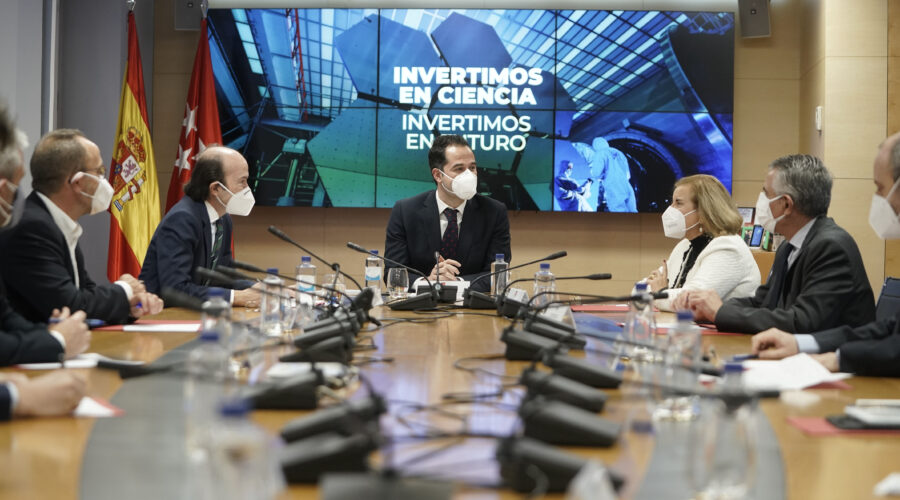IMDEA Networks

Ignacio Aguado: “Invertir en ciencia es invertir en futuro”
Reunión del vicepresidente madrileño con los directores y gerentes de los siete Institutos Madrileños de Investigación Avanzada (IMDEA)
10 Febrero 2021

El vicepresidente, consejero de Deportes, Transparencia y portavoz de la Comunidad de Madrid, Ignacio Aguado, se ha reunido con los directores y gerentes de los siete Institutos Madrileños de Investigación Avanzada (IMDEA). El encuentro, donde Aguado se ha mostrado convencido de que “invertir en ciencia es invertir en futuro”, ha servido para conocer los desafíos a los que se enfrentan los IMDEA y los grandes retos que estos tienen por delante.
El vicepresidente madrileño ha defendido que la recuperación exige una apuesta decidida por una economía sólida basada en el conocimiento. Para ello, es necesario –ha dicho- un impulso a la investigación y la innovación “como palanca de crecimiento”. “Sin ciencia no hay futuro y no hay progreso”, ha asegurado. En este sentido, Aguado ha avanzado que los presupuestos negociados en el seno del Gobierno de la Comunidad de Madrid para el año 2021 contemplan un incremento sustancial para ciencia e innovación, que asciende al 30% respecto a ejercicios anteriores.
La apuesta del Ejecutivo regional por la investigación “es clara y más decidida que nunca, sobre todo dadas las actuales circunstancias mundiales derivadas de la pandemia”, ha señalado Aguado, que ha apostado por “seguir situando a la ciencia en el centro de las políticas”, y construir “una región puntera y alejada del conformismo”. En su opinión, “tenemos una oportunidad única para dar un espaldarazo a la ciencia en la Comunidad”.
“Realizamos investigación puntera y la inyectamos en el tejido productivo”
El director de IMDEA Networks destacó durante su participación, como portavoz de los Institutos IMDEA “la visión del consejero Sicilia, del vicepresidente Aguado y de todo el gobierno de la Comunidad por su apuesta decidida por una economía basada en el conocimiento y, por lo tanto, por la investigación y la tecnología”. “Los ciudadanos -destacó Azcorra- son crecientemente conscientes de que la investigación y el bienestar son totalmente equivalentes: la investigación es empleo y empleo de calidad, es crecimiento económico, es mejor educación y mejor salud para los ciudadanos. En los siete Institutos IMDEA de la Comunidad de Madrid realizamos investigación puntera y la inyectamos en el tejido productivo. Son igualmente importantes nuestros resultados punteros de investigación como la mejora en empleo, el crecimiento económico y las mejoras en educación y salud que nuestros descubrimientos y patentes están generando. Un gran éxito que es el catalizador para una economía madrileña basada en el conocimiento”.
Palanca de transformación
Durante la reunión, el vicepresidente ha trasladado a los directores de los IMDEA el apoyo del Gobierno autonómico a estos organismos, que “son el mejor y más exitoso ejemplo de focalización en ámbitos estratégicos de investigación científica y tecnológica regional”. Un apoyo extensible a las actividades investigadoras y acciones específicas en tecnologías disruptivas que desarrollan.

La Comunidad de Madrid cuenta con siete Institutos Madrileños de Estudios Avanzados, en: Agua, Alimentación, Energía, Materiales, Nanociencia, Networks y Software. Fundados entre 2006 y 2007, en este tiempo han desarrollado más de 1.427 proyectos de I+D. Su misión es ser una palanca de transformación de la sociedad y la industria, a través de la generación de conocimiento y tecnología en ámbitos específicos de alto impacto socioeconómico, e identificados como estratégicos tanto por las empresas como por la sociedad.
Las 726 personas que trabajan actualmente en los proyectos de I+D de los IMDEA generaron en 2019 un volumen de actividad de 41,4 millones de euros. La mitad de esa cantidad proviene de la financiación que aporta la Comunidad de Madrid y el otro 50% de fondos externos. Los centros captan la financiación adicional en convocatorias públicas competitivas (internacionales, estatales y regionales), así como a través de contratos con empresas. Se han firmado 556 contratos con entidades de todo el mundo, como Microsoft, Google, Airbus o Boeing. Además, ocupan puestos destacados en los rankings internacionales de publicaciones científicas y tienen en su haber 38 patentes concedidas y otras 32 solicitadas.


Comentarios recientes